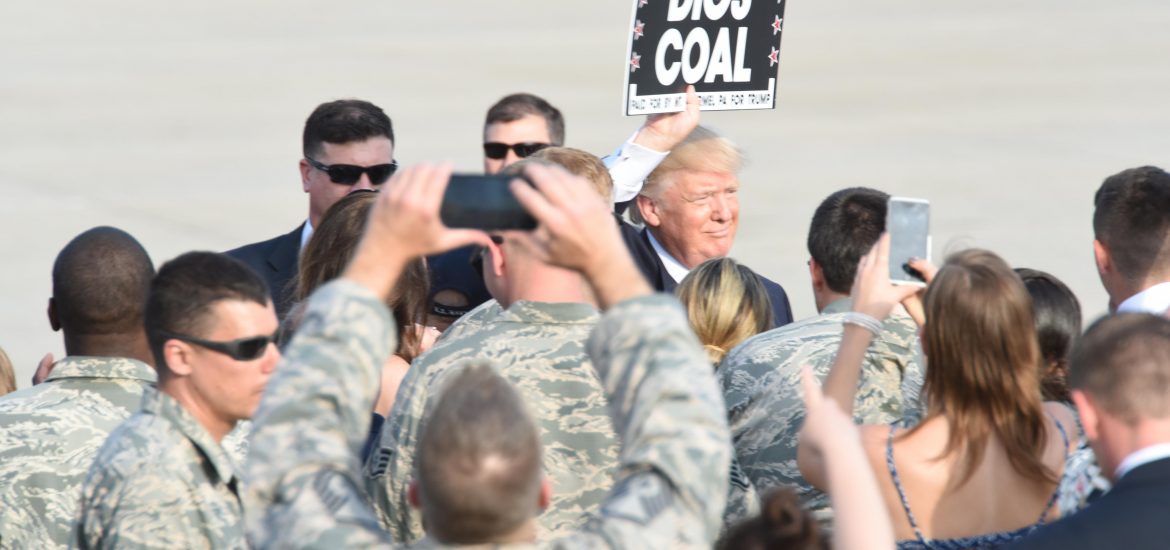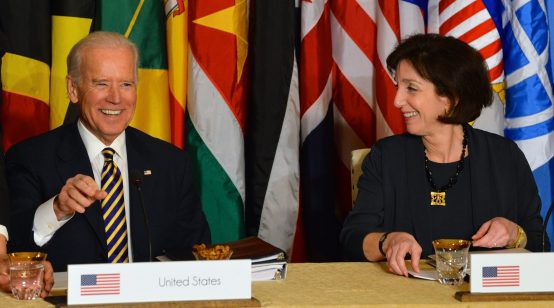
Assuming Donald Trump moves ahead with his planned tariffs, the international trade community will need a way to hit Trump below the (Rust) Belt. It could land a solid punch with coal.
On March 1, President Trump stunned the international community—as well as his own staff and members of his own party—by declaring that he intended to levy tariffs on steel and aluminum imported to the United States. Reports suggested that this policy emerged during a fit of pique, and exact details are still forthcoming. This has raised hopes that the Trump Administration will soften the policy or have its hands tied by the Republican Congress.
The international community should gird itself all the same. Donald Trump’s Twitter feed continues to offer the most unvarnished window into the President’s worldview. If that account is to be believed, Trump is likely to barrel forward. Since he first floated the idea of tariffs, Trump has issued nearly one dozen tweets embracing the idea. On March 5, for instance, Trump tweeted, “Our Steel and Aluminum industries are dead. Sorry, it’s time for a change! MAKE AMERICA GREAT AGAIN!”
As currently constructed, this policy is foolish in several ways. Perhaps most misguided is that it will miss its intended target and cause collateral damage. Since the 2016 campaign—and, indeed, for decades prior—Donald Trump’s great hobbyhorse has been China’s economic might relative to the United States and, more specifically, China’s trading relationship with the United States.
Tariffs on steel and aluminum will, by definition, do little to alter this balance. As of 2017, China is not among the top ten exporters of steel to the United States and, likewise, is just the fourth-largest exporter of aluminum to the country. In the case of both commodities, top honors belong to Canada, with other U.S. allies such as Brazil, South Korea, and Germany also accounting for meaningful volumes of trade.
Retaliating with coal
With the announcement looming, elected officials from affected countries friendly to the United States have signaled that they are prepared to retaliate in the event Trump opts to move ahead. In doing so, they have indicated that they will pursue approaches that have more to do with savvy politics than substantive policy.
Jean-Claude Juncker, the President of the Europe European Commission, initially floated the idea of levies on Levi’s jeans, Harley-Davidson motorcycles, and Kentucky bourbon. On March 7, Brussels hinted at a longer list that included those items as well a menagerie of other consumer goods. It is, of course, no coincidence that these levies disproportionately impact American brands with a manufacturing presence in states that helped hand Trump the Electoral College.
As it finalizes the composition of this list, the international trade community would be wise to take aim at another American export from Trump-friendly constituencies: coal.
Another preoccupation of Donald Trump—in addition to beggar-thy-neighbor trade policies—is the revitalization of the American coal industry. To hear Trump tell it, his election heralded the end of the Obama Administration’s neglect and outright animosity toward the coal industry.
Accordingly, since taking office, Trump has regularly touted his efforts to spark a coal renaissance. In an appearance on Meet the Press, EPA Administrator Scott Pruitt claimed that the Administration was responsible for creating 50,000 new coal jobs. In the speech in which Trump announced the U.S. withdraw from the Paris Climate Accord, he hailed the opening of new mines in “Pennsylvania, Ohio, West Virginia, so many places.”
These claims do not hold up under scrutiny and, more broadly, the plain fact is that the American coal industry is in inexorable decline that will continue throughout and past the Trump Administration.
Against this backdrop, trade measures aimed squarely at American coal exports could prove useful in two ways.
To begin with, they could, at the margin, expedite the phase-out of the U.S. coal industry, which currently draws some of its sustenance from international exports. Moreover, these exports map neatly onto the countries that would be harmed by Trump’s steel and aluminum imports: leading export markets for American coal include Canada, Brazil, and Western Europe. Substantively, then, the price impact of—or price uncertainty created by—coal tariffs could undermine the ability of American coal companies to ship their goods overseas.
In addition, a tariff on American coal would be a powerful political instrument. First, such measures would reaffirm the embryonic international commitment to decarbonizing the international economy. Second and related, such measures would call attention to the fact that, on the subject of climate change, the United States has become a pariah, woefully out of step with the rest of the world. Third, it would provide to American voters yet more proof of the central falsehood of the Trump Administration: that entrenched social problems can be waved away with cheap talk and shoddy policy.
Donald Trump is said to regard himself as a counterpuncher: if you punch him, he punches you back twice as hard. The international community should embrace this worldview by contemplating retaliatory measures against American coal.





